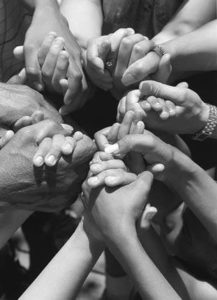Anyone is welcome to come to church.

Anyone is welcome to come to our church at Hope.
Black, white, Tongan, Korean, Anglo, student, retired, gay, bi, straight, depressed, confused, excited, addicted, uncertain, young, old, child (actual or at heart), loud, noisy, shy, radical lefty, devoted conservative, local, tourist, or wanderer by. Come along on Sunday, or Tuesday, or Wednesday. Most days there’s something going on and people around.
You are welcome.
You are welcome if you already follow Jesus or if you want to try it out.
You are welcome if you follow another religion and just want to share together.
You’re most welcome if you’re uncertain about any sort of faith and just want to talk.
You are always welcome.
I pray, that in this way, we are always inclusive — arms wide open to anyone and everyone. But if WE are to be inclusive, then we can never lose sight of who WE are called to be. Or to put it another way: it’s all well and good to be inclusive, but what is it that we are including people in?
We are called to be the Christian church — a community fashioned, shaped, and formed as disciples of Jesus Christ. So, we will pray and sing, and read the Bible, and use words from Scripture that might sound funny in our society. And we will strive to explore them together and make sense of them (and sometimes get it wrong). We’ll share in communion and find it a mystery.
And the more we explore the scriptures and this following of Jesus, the more we discover that we are called into a particular rhythm and a peculiar shape as a community that won’t be like everyone else.
Because it is the content of discipleship that determines the shape of the discipleship community. It is the person of Jesus that gives us the way we are to live.
That means we practice confession and forgiveness — this grace is central to Jesus. That means we look to the poor, the meek, the humble, and the oppressed first — just like Jesus. It also means we should hold each other accountable to pray and fast and to read the Scriptures, just like Jesus. And we listen for the transforming presence of the Holy Spirit. And so much more.
As a community as we are shaped by these habits, we find our peculiar identity. There is no being the church without striving for and leaning into these habits and practices. In that regard, we are a community of exclusion.
I will happily continue to be friends and neighbours with people from almost all creeds and faiths. More than that, I will always seek for in-between spaces where I willingly put aside my own certainties to be alongside others, to learn and be changed.
But to be in the church is to yearn after the life of Christ together. I will never expect or demand that everyone hold this same yearning. But I will pray and live for a church that does.
Andrew



Leave a Reply
Want to join the discussion?Feel free to contribute!